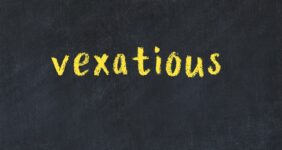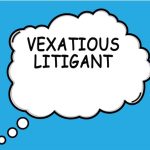The Laws Relating to ‘Vexatious Proceedings’ and ‘Vexatious Litigants’ in NSW

Sydney property developer and former deputy mayor of Auburn City Council, Salim
Mehajer, has been added the list of those who commence ‘vexatious proceedings’ in New South Wales, and his civil claim against 17 former associated has been stopped in its tracks.
No stranger to the law
Mr Mehajer is certainly no stranger to the justice system.
In 2014, he pleaded guilty to failing to declare political donations and, in 2018, was sentenced to 21 months in prison after being found guilty of 77 counts of electoral fraud stemming from a 2012 NSW Government election.
Mr Mehajer has also been convicted of assaulting a taxi driver and a reporter, as well as supplying a prohibited drug, dishonestly destroying or damaging property for financial gain and negligent driving in relation to a staged car accident that occurred when he was due to face court over his assault charges.
He is currently behind bars in Cooma Correctional Centre on the South Coast of New South Wales, where he is serving prison time for perjury (lying under oath) .
Fall from grace
Before being declared bankrupt in 2018, Mr Mehajer was known for splashing his money around on expensive properties, luxury sports cars, designer clothes and exclusive jewellery.
In 2015, he famously landed at a location hear his own wedding in one of four helicopters commissioned for the event, before him and his entourage hopped into a fleet of luxury sports cars to complete the journey.
Banned from directing companies
In August 2016, the Australian Securities and Investments Commission (ASIC) banned Mr Mehajer from managing any corporation for three years “as a means of protecting others from his incompetence”.
At the time, it was reported that his failed businesses owed about $1 million to the Australian Tax Office.
Mr Mehajer contested the decision through an appeal to the Administrative Appeals Tribunal, but was unsuccessful.
Vexatious case
But his latest court battle has resulted in a declaration by the Supreme Court of New South Wales that his $52 million claim against his former business associates was ‘vexatious’
Mr Mehajer commenced civil proceedings against 17 defendants who he asserted were associated with, or involved in, the fallout of a development project in Lidcombe which resulted in his bankruptcy.
When the matter came before the court earlier this week, Justice Geoff Lindsay found the proceedings to be vexatious and imposed a permanent stay of proceedings on the basis that they were an abuse of the court process, effectively stopping the case in its tracks.
During his judgement, his Honour remarked that, in recent years, Mr Mehajer had brought a series of cases which were vexatious or had “harassed’ and annoyed his opponents.
The Learned Judge also found that Mr Mehajer was ignoring or “trying to circumvent” a previous Federal Court judgement in relation to his bankruptcy.
Mr Mehajer was ordered to pay the legal costs of the defendants, which he is unlikely to be able to do due to his current situation.
What are ‘vexatious proceedings’ in New South Wales?
Section 6 of the Vexatious Proceedings Act 2008 (NSW) defines ‘vexatious proceedings’ as those which are:
- an abuse of the process of a court or tribunal, and
- instituted to harass or annoy, to cause delay or detriment, or for another wrongful purpose, and
- instituted or pursued without reasonable ground, and
- conducted in a way so as to harass or annoy, cause delay or detriment, or achieve another wrongful purpose.
What is a ‘vexatious proceedings order’ in New South Wales?
Section 8(1) of the Act prescribes a mechanism whereby the Supreme Court, Land and Environment Court or Industrial Court can make what is known as a vexatious proceedings order against a particular person, in which case the court may:
- order that existing proceedings in NSW be ‘stayed’ (ie stopped),
- prohibit the person from instituting proceedings in NSW, or
- make any other order it considers appropriate in relation to the person.
The court can make such as an order if it is satisfied that the person:
- has frequently instituted or conducted vexatious proceedings in Australia, or
- acted in concert with a person who is already subject to a vexatious proceedings order or who has instituted or conducted vexatious proceedings in Australia.
While the Supreme Court has the power to make such an order for all three of the mentioned courts, the Land and Environment Court and Industrial Court can only make orders that are effective in their own jurisdictions.
What may a court consider when determining whether a ‘vexatious proceedings order’ should be made?
Section 8(2) of the Act provides that when determining whether a vexatious proceedings order should be made, the court may have regard to:
- proceedings instituted or conducted at any time in any Australian court or tribunal,
- orders made at any time by any Australian court or tribunal, and
- evidence of the decision, or a finding of fact, of any Australian court or tribunal hearing such proceedings or making such orders at any time, even if that evidence would otherwise not be admissible under the Evidence Act.
What does the case-law say?
The common law test for determining whether proceedings are vexatious was set out by Supreme Court Justice Adrian Roden in the case of Attorney General v Wentworth (1988) 14 NSWLR 481 at paragraph 491, where his Honour states:
- Proceedings are vexatious if they are instituted with the intention of annoying or embarrassing the person against whom they are brought.
- They are vexatious if they are brought for collateral purposes, and not for the purpose of having the court adjudicate on the issues to which they give rise.
- They are also properly to be regarded as vexatious if, irrespective of the motive of the litigant, they are so obviously untenable or manifestly groundless as to be utterly hopeless.4. In order to fall within the terms of s 84 [now section 8 of the Vexatious Proceedings Act 2008]:
(a) proceedings in categories 1 and 2 must also be instituted without reasonable ground (proceedings in category 3 necessarily satisfy that requirement);
(b) the proceedings must have been ‘habitually and persistently’ instituted by the litigant.
Who can make a ‘vexatious proceedings order’?
Section 8(4) of the Act provides that a vexatious proceedings order can be made by an authorised court of its own motion or on the application of any of the following persons:
(a) the Attorney General,
(b) the Solicitor General,
(c) the appropriate registrar for the court,
(d) a person against or in relation to whom another person has instituted or conducted vexatious proceedings, or
(e) a person who, in the opinion of the court, has a sufficient interest in the matter.
What is the meaning of ‘vexatious litigant’ in New South Wales?
A person who is, under section 8 of the Act (which superseded section 84 of the Supreme Court Act of 1970), prohibited from instituting proceedings in New South Wales is commonly known as a ‘vexatious litigant’.
Those who are declared vexatious litigants are prohibited from commencing civil proceedings in New South Wales without the ‘leave’ (permission) of the court.
How can a ‘vexatious litigant’ commence a civil case?
In order to commence a civil case in a New South Wales court, a person who is subject to a vexatious proceedings order must file:
- A summons, and
- An affidavit in support of that summons which:
(a) lists all occasions the person has applied for leave,
(b) lists all other proceedings commenced in Australia, and
(c) discloses all known facts material to the application, whether supporting or adverse to the application.
The application for leave should not be served on any other person, unless the court orders this to be done.
The court can either grant the application or dismiss it.
The court must dismiss the application if the affidavit does not substantially comply with the above requirements, if the proceedings are vexatious, or if there are no undeniable grounds for the proceedings.
Before leave is granted, the court will order the applicant to serve all relevant persons and give such people an opportunity to be heard.
There is no right to appeal against an application to refuse leave.
Is there a list of people who have brought ‘vexatious proceedings’ and those declared ‘vexatious litigants’?
Yes, the Supreme Court of New South Wales publishes a list of those against whom these orders have been made, as well as the specific orders made by the court.








